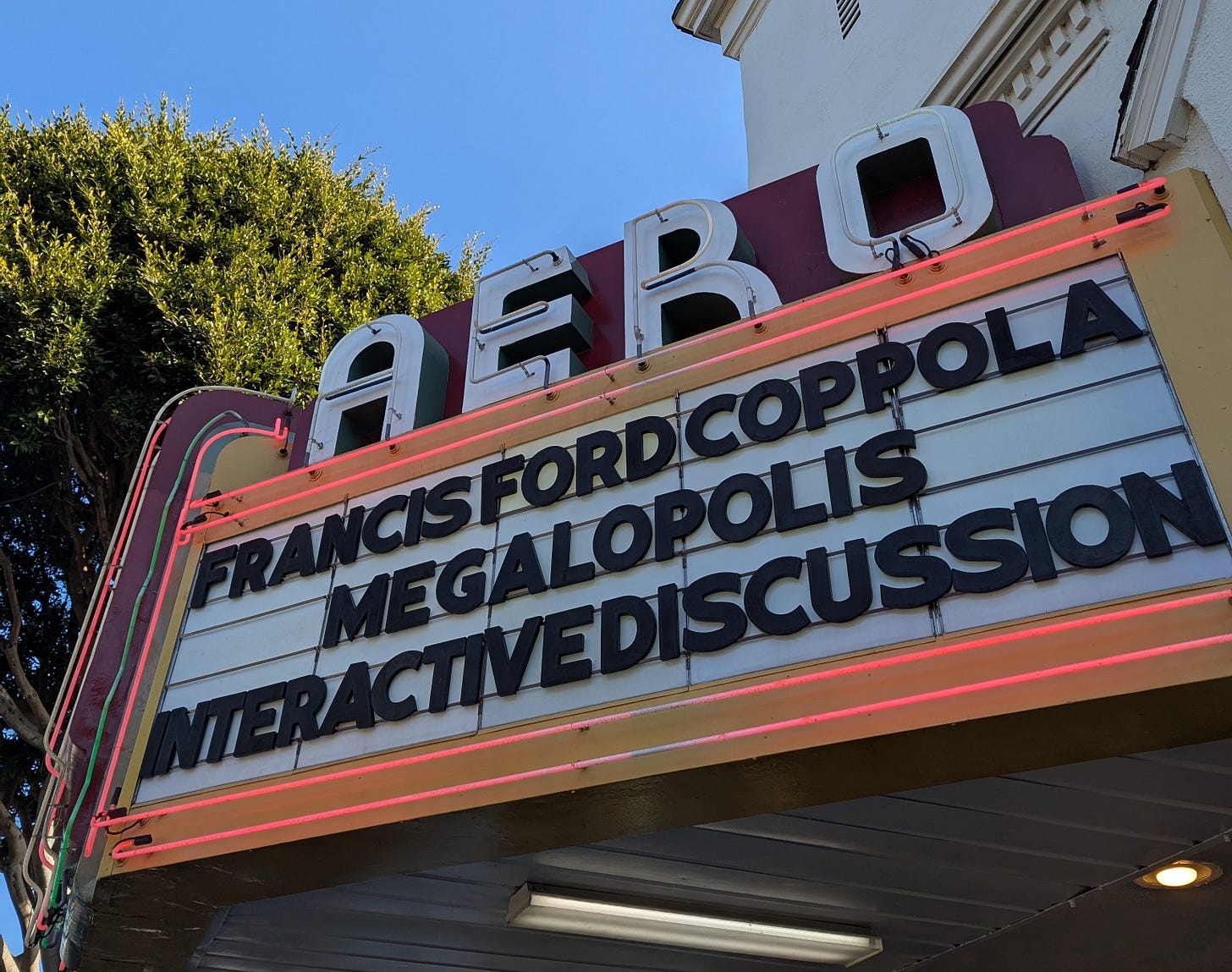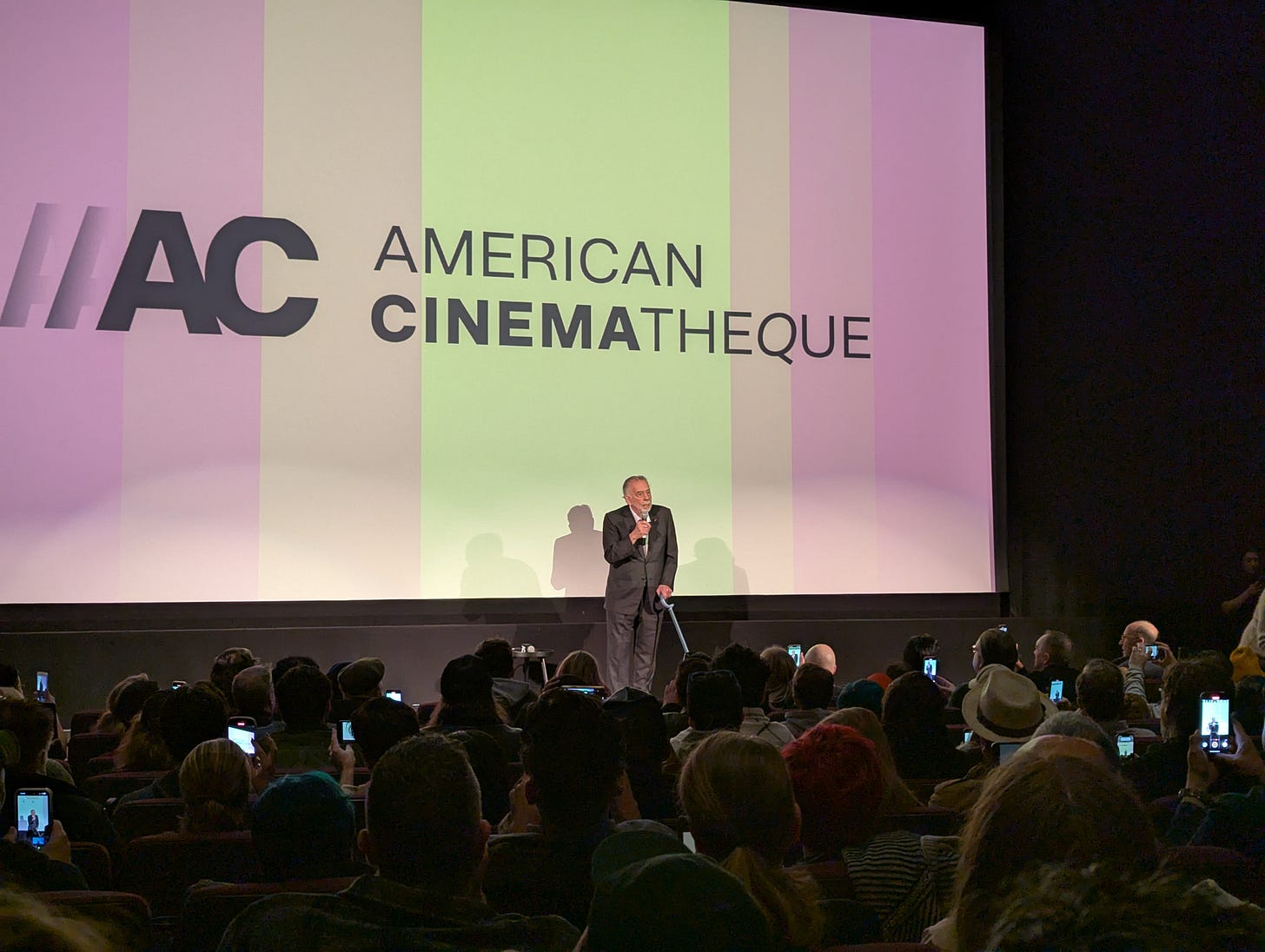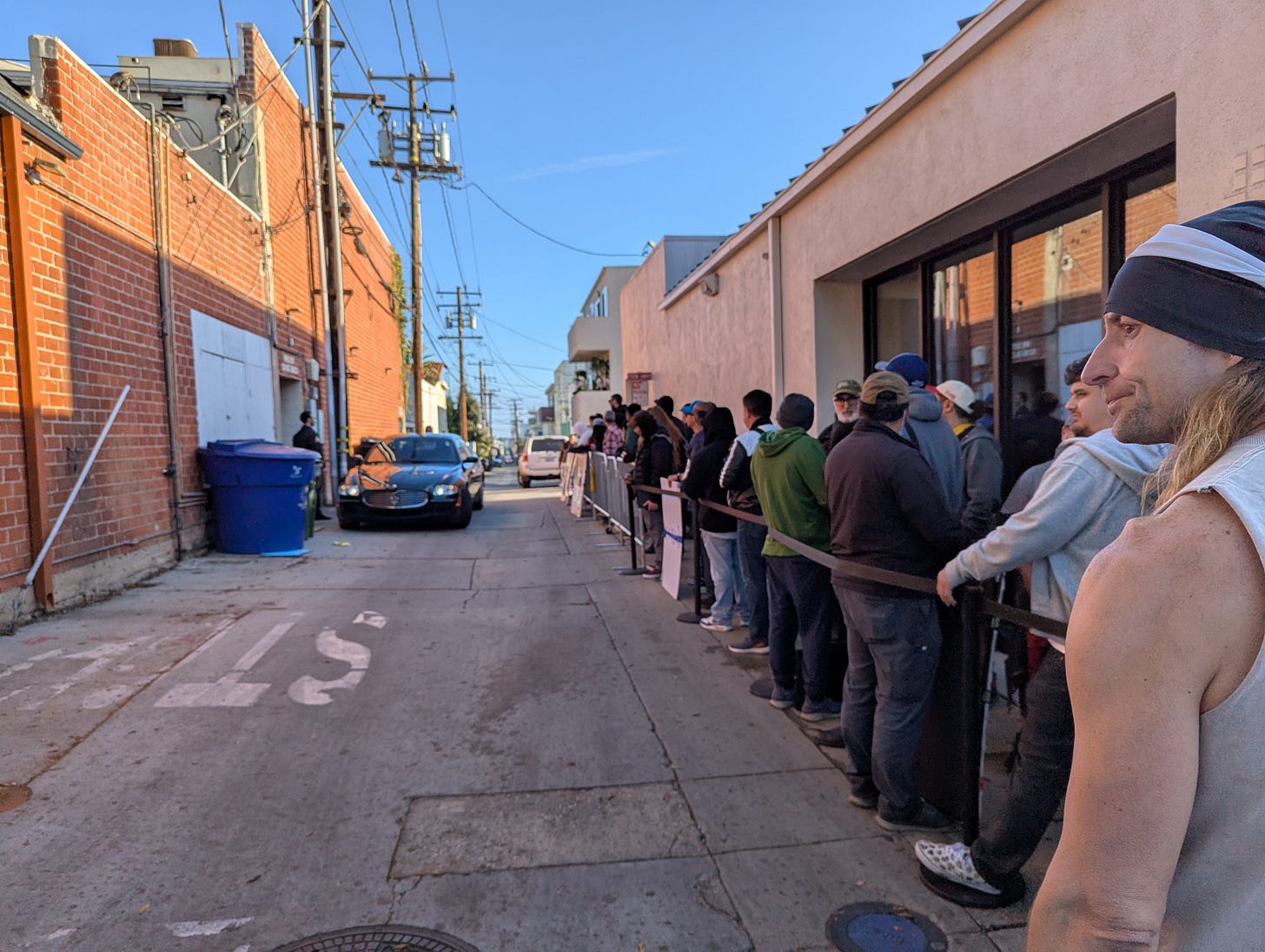On New Year’s Day the American Cinematheque (a popular non-profit film organization in Los Angeles) hosted a screening of Megalopolis followed by an ”Interactive Discussion” with its filmmaker Francis Ford Coppola. Although I’d seen the film once before, I was enticed into a second viewing by the event’s tagline, written by Coppola himself: “WE ARE IN NEED OF A GREAT DEBATE ABOUT THE FUTURE!”
I took this to mean the event would be a forum for discussing the future of cinema and that it would be moderated by an auteur who’d made several masterpieces across his career despite the failures (commercial or otherwise) that had ultimately driven him away from Hollywood. As it turns out, I was quite misguided in this assumption.
The crowd filtered in around 10 am, one hour before showtime. Silverlake beanies and chore coats mixed with west side scarves and cotton blazers, all accented in places with movie paraphernalia so fringe it would make an A24 hoodie pinch its nose. We took our seats and waited patiently for the film to begin.
Then, just before showtime, the legendary white-bearded, soft-eyed director, with the help of an elegant cane and its C-shaped handle, took the stage to a standing ovation. He put a stop to this fanfare with a charming self-deprecating remark (which I cannot now recall) then began his introduction with the fact that recorded human history only goes back about 10,000 years. It was his feeling, he told us, that in all this time the greatest advances of mankind had been inspired by children. (Mayans created wheel-based toys long before the technology was adopted for transportation and in ancient China bamboo firecrackers preceded the rise of gunpowder.)
“Play is what we do best as humans,” he said.
This was the first context in which he wished to frame the screening. The second was via some slippery notion of time. He insisted we imagine it was New Year's Day 2027 and assured us – although it still isn’t quite clear to me how – that this imaginary lapse in time would lessen the “work” of watching the film and foster a spirit of play in the discussion that followed. Finally, he announced this discussion would be prompted by a question in the film: “Is the society we’re living in the only one available to us?” Then he took his seat, the lights came down, and the movie began.
For those who don’t know, Megalopolis follows an eccentric architect named Cesar Catilina (Adam Driver) who heads the “Design Authority” of New Rome. His discovery of a new material called Megalon (for which he won a nobel prize) inspires plans for a new development called Megalopolis – an alternative to an uninspired steel and concrete Casino development proposed by Mayor Cicero (Giancarlo Esposito), leader of this dying republic. His daughter, Julia, proves suspicious of his rival until she attends a scheduled Design Authority demolition overseen by Cesar. Moments after the dynamite explodes, Cesar slows time to study the shape of the building’s disintegrating structure. This ability to abstract time from form is lost on everyone in the crowd except for Julia who seems capable of perceiving it. As time slows, the two briefly lock eyes, and a shared vision passes between them. For Julia the moment is a revelation – her first encounter with real genius – and afterwards she decides to dedicate herself to Cesar’s mission and help bring his utopia to life. While this is the central thrust of the movie, other competitions for power play out in the background that occasionally disrupt it: Cicero works to save the city and retain control via conventional administrative avenues, Cesar’s cousin Clodio (Shia Lebeouf) attempts MAGA-style populism with catchy rally cries and fake news stories, and media personality Wow Platinum (Aubrey Plaza) orchestrates an internal takeover of the city’s Central Bank by marrying Cesar’s uncle Hamilton Crassus III (Jon Voight).
The first time I saw all this play out I found it excessive in a way that starved the film of substance despite its untamed, dare-I-say playful nature. But there were reasons to doubt the purity of that first impression under the influence of the many meta-media-narratives surrounding its initial release.
For better or worse, Megalopolis did not neatly fit into contemporary industry archetypes. In place of a streaming service bankrolling a name-brand filmmaker’s three-hour long passion project, or yet another media conglomerate shepherding low risk, big budget IP to the box office (or worse, withholding a release so as to declare a loss on its balance sheet), here was a legendary auteur who had risked his net worth to create a bold and uncompromising American epic. Did this mean the film ought to be embraced as a work of pure creative genius, no matter the quality? Or could it be just as easily dismissed as the misguided venture of a bygone filmmaker (and wine producer) no one could say no to?
Upon second viewing, I felt less hindered by these notions, as if two years actually had passed, and found my own way into the movie.
There was more coherence to the palace intrigue than I’d initially thought, more to savor in the Roman-American fusion that marked the production design, more levity and humor in the stylized performances (by Driver and Plaza in particular). There was also the added embellishment of a live performer at this special screening. After the scene when wreckage from a decommissioned Russian satellite rained down over New Rome, a performer took to the stage and placed a microphone in front of the screen. Then, facing away from the audience, he gesticulated along with a reporter’s voiceover as the film faded in on Cesar Catilina at a press conference.
“Mr. Catilina, You said we should jump into the future unafraid, but what if when we do jump into the future there is something to be afraid of?”
Not long after this scene, the credits were rolling and Coppola was opening up his “Interactive Discussion” with the introduction of two special guests to accompany him on stage: Juliet B. Schor, a professor of Economics and Sociology at Boston College, and her collaborator, Tim Augustine, who were working on a “new kind of platform for creative people… based on the premises of a democratic economy and community.” Unfortunately they never found time to explain exactly what this platform was or how it related to the broader discussion topic. But more on that in a moment.
Coppola kicked things off with a deluge of his own thoughts, which ranged from the observation that much of art today follows the model of fast food to the ways in which the work of Robert Moses and Jane Jacobs influenced Megalopolis. He cited takeaways from David Graeber’s book The Dawn of Everything and Giovanni Pico della Mirandola’s Oration on the Dignity of Man to bolster his belief in the inherent “genius of the human being,” predicted money would cease to exist in the near future, and ended his spiel with the insistence that we dismantle concentrations of power at the federal and state level to give control of societal wealth back to localities, noting how he’d managed to do a version of this through a charitable organization he started in San Francisco in the early 2000s called the North Beach Citizens.
All of this seemed quite agreeable to yours truly, but was beginning to feel more like a monologue than a conversation. After twenty minutes of speaking, he eventually remembered to bring his conversation companions in whilst encouraging the audience to hop in at their leisure, although this sort of involvement hardly seemed likely given the decorum and design of the event.
Schor offered a contribution by highlighting the way Coppola used nature as a model for his utopia and, in turn, asserted that a healthier society would place nature at the core of its vision. But before she could buttress these claims, Coppola jumped back in with an idea from John Ruskin about wealth and how it ought to be distributed throughout a society like blood in the human body: regular circulation to all the organs, “not just the ones that have clout!”
I’m sorry to report this was the rhythm that took hold for the next forty minutes of the “interactive discussion.” Schor continued to make connections between the film’s themes and her work while Coppola used said remarks as jumping off points for ever more anecdotes and literary associations (ranging from Stephen Greenblatt to Stefan Zweig) as the audience grew more and more restless feeling its opportunity to interact with this great filmmaker slip away one anecdotal aside at a time.
Eventually, perhaps recognizing Coppola’s tendency to follow tangential thoughts wherever they led him, Schor reintroduced her colleague, Augustine, who attempted to account for his presence on the stage by advertising his work on a project called the Democratic Economy (an annual event in which, he explained, young entrepreneurs discuss their role in implementing more equitable forms of wealth distribution in society). It seemed to resemble the kind of redistributive intentions Coppola had advocated for earlier (if you blurred your eyes a bit, anyway).
Finally, with some twenty minutes to spare, Coppola began calling on hands that had been raised intermittently over the course of the first hour. Unfortunately the crowd, perhaps collectively anxious about the undemocratic unfolding of the event thus far, was now quite perturbed. Many had already filtered out of the theater whilst others squirmed in place or made weak rebuttals under-their-breath when the politics represented on stage did not align neatly with their own.
One of the first questions was about the film’s screenplay, which Coppola answered succinctly before reminding everyone they were there to talk about something much more important: the future! But when another questioner, rather astutely, pressed him on the fact that the central characters of his film were all plutocrats, including his utopian protagonist – which suggested there was some conflict between his film and the world views he was espousing on stage – he didn’t seem very interested in accounting for the discrepancy.
Another person asked how grand scale societal goals might be achieved if society were reorganized in the ways the panel had endorsed. An interesting line of inquiry, which, like the previous question, was greeted only with a few anodyne remarks from Coppola then brushed aside in the rush to get to more questions.
Soon all hell broke loose.
Microphones handed out by AC volunteers to facilitate better audio resulted in a phenomenon in which every time Coppola called on a raised-hand, the voice of another microphone-bearing individual powered through the theater, voice-of-God-like, to speak in place of the person we’d all turned towards.
In one particularly egregious instance, a man dressed like Johnny Depp acknowledged his interception of another audience member’s question then proceeded to grandstand by going on about how brave Coppola was for making this film before proclaiming his own commitment to the arts via an offhand reference to his theater career in New York. Before the audience could tear this individual limb-from-limb, Coppola interrupted: “Do you have a remark about the future of our society?” He did not.
Finally, a proponent for a movement called the “New Communism” took the mic with a foreboding energy that challenged the tame direction Coppola and his stage companions had proposed. She insisted upon the necessity of a real revolution before this sort of open space we had all (apparently) been occupying for the past eighty minutes was lost for good under the oligarchic regime set to take control of our government in the coming weeks.
Despite the assent communicated by a final burst of applause from the audience, it was clear the room was spent and, with only a few minutes left for the event, had accepted that there would be no time to devise anything resembling a discussion before Coppola had to take off. The woman began handing out some pamphlets anyway.
I recalled Cesar’s line at the press conference: “When we ask these questions, when there's a dialogue about them, that basically is a utopia.”
Unfortunately the event had fallen short of a dialogue, let alone a utopia. But questions were certainly asked. Eight by my count.
Outside the venue, a long line of men armed with sharpies and Godfather memorabilia stood in an alleyway beside the theater and waited for Coppola to file out the backdoor and into his Maserati. A woman walking just ahead of me asked one of the men why they were all standing around, to which he responded in a rather nasty tone, “You just sat and listened to him talk for ninety minutes. Why the fuck do you think we’re all standing here?”
Like Megalopolis, our interactive discussion hadn’t exactly yielded a convincing alternative for America’s future, or a promising direction for the conversations we have about it. Instead the whole event resembled something more like our present political moment: a debate about the future held by a few wealthy individuals while a captive audience sits idly by, waiting for its turn to jump in – patient, indignant, impotent.
Or maybe I’m being harsh given what a benevolent presence Coppola can be even when he is monopolizing the conversation. His movie isn’t half-bad, and I’d hate to fall into the trap of overestimating its relevance here in the face of an ongoing constitutional crisis in America. Perhaps we put too much on the shoulders of artists as it is, and not enough on the Catilinas, Ciceros, Platinums, and Crassuses who exert unfathomable influence on our lives.
I’m sure this will all make more sense by January 1, 2027. But hey, in the meantime, at least we’re asking the right questions?






